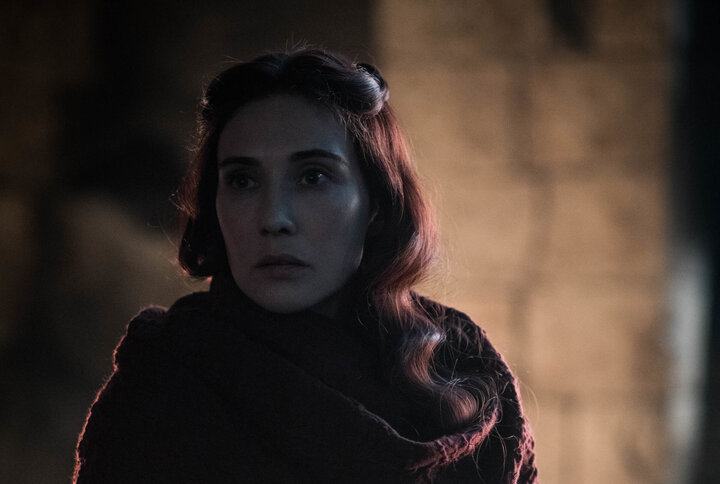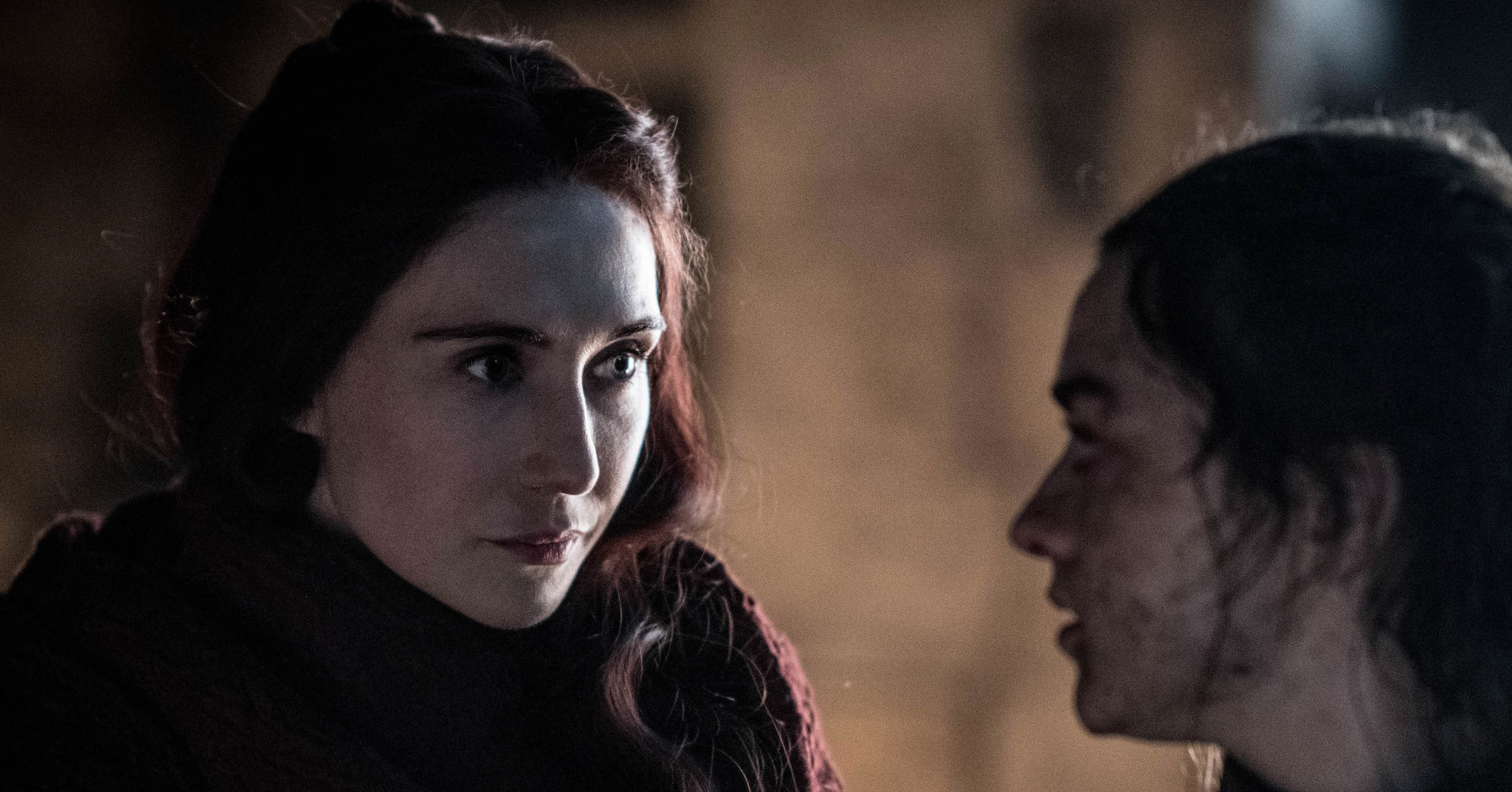[ad_1]
Actress Carice van Houten’s crimson-covered Melisandre first caught our eye on “Game of Thrones” in Season 2, when she held a ceremony on a beach to burn effigies of the seven gods widely worshipped in Westeros.
Back then, she was serving one of the Baratheon brothers, and she wasn’t too popular.
Fast forward to the eighth and final season ― past a poisoned maester, a demon shadow baby, a bastard bloodletting, a man resurrected and a child made to burn at the stake ― and she’s still not exactly being named prom queen. As one of the series’ most complicated characters, Melisandre has nonetheless been present, and sometimes responsible for, numerous key plot twists.
But in “The Long Night,” Episode 3 of the season, after spending hundreds of years trying to save humanity from utter devastation, Mel finally kicked it.
We may never find out exactly where she came from, what she did before the story began, or exactly how old she is, but at least we know why she took off her magic, life-preserving choker to let herself die when she did ― after the battle between the living and the dead had been won.
Whether “conscious or unconscious,” van Houten told HuffPost, “that was always the thing she was working towards.” That is, ensuring the living survived before she herself joined the ranks of the dead.
Below, we talk about that final moment and why it was so tough to play the lady in red.

So, you wrote on Instagram that Tuesday night was your first time seeing Episode 3. What did you think? Did anything surprise you?
Well, it surprised me how emotional I got from it. Of course, I was a bit geared up ― everyone had warned me. But still, to then actually see it. I was watching it with a friend, and when it was over I was sort of joking and trying to be funny, and not let the emotions hit me, and then when he left, we watched a bit again because it was quite fast, everything. And it really hit me. I didn’t see that coming, and I just got all sad. But not just because of my own character dying ― just everything adding up, really. The buildup to that episode was so great, and the music was great. I felt so honored to be the last note of that piece of music.
It just felt like the nightmares that I have sometimes. Being chased. It also tapped into everyone’s primal fear of dying ― we’re all trying to run away and we’re all scared for that unknown thing. It doesn’t matter who you are, you can’t escape it. So it sounds sentimental but it felt almost like, when the time comes, we need each other. It doesn’t matter, all our little wars and our little fights. It’s about standing together.
Why did Melisandre take off the necklace when she did?
I think that it’s always been, whether conscious or unconscious, that was always the thing she was working towards. It felt really like her purpose had been served and there was no reason for her to stay alive after all these hundreds of years. It was sort of a bittersweet ending, finally being able to let that journey go.
Even though she’s this ancient character, she seems to change over the course of the series and ends up questioning herself and her purpose. Overall, how would you like fans to think of Melisandre?
It is a character that really plays with your sense of moral, I guess, and really confuses that, confuses your view on a person. One moment she burns a child alive, she thinks that’s a good thing to do ― which, of course, is the most horrifying act you could think of. And then she brings Jon Snow back to life. So that’s really confusing for an audience! Where’s your sympathy, you know? And I think that’s good, because it challenges the mind.
It’s a tricky character. It’s been a tricky character for me to play, as well.
I can see that ― people were not happy after she burned Shireen. But her whole arc gives you a bit of whiplash.
I mean, I’ve always tried to defend her as much as I could ― which is, of course, tricky, because how do you defend someone who burns a child alive? That’s a tricky thing. In order for her to accomplish what she needs to do, in order to save everyone, she needs to do such a horrifying act that she couldn’t even allow [herself] to get [emotional]. Otherwise she couldn’t have done that. And she shouldn’t have done that, obviously, and we see how that affected her. That’s what makes her human for the first time. It’s not like, “Ah, well, I fucked up. Oh well! Whatever.” You do realize she damn well knows the fact that it didn’t work and is a very sad affair. It’s been a tricky character because of those extreme acts.
Do you ever get extreme fan reactions, when people see you?
It’s usually nice things. Yes, when I burned Shireen, I got a lot of death threats to my character via Twitter and Instagram. But you know, I didn’t take that personal. And I didn’t take the questions whether people could marry me, the season after when I brought Jon Snow back alive, didn’t take those serious, either. It was just fun to see how fickle the audience was themselves, you know?
It’s just funny that I ended up playing this character. I find it very funny that I was the one playing this character. Of all the things I think I’m good at, being confident and being a stern, strong woman is not the first thing that comes to mind.
Shooting that episode seemed kind of awful, so many nights in the cold, wind and rain. How did you guys keep morale up on set?
I mean, if you have Liam Cunningham [Davos] there, you’re fine. Because, I mean, he’s just a goofball that takes the piss. He’s funny. He’s a very good colleague. But I wasn’t there for the full 11 weeks, I came in and out.
The crew was just amazing. I felt like such a wussy and such a fucking diva ― I’m not a diva, but I felt like, how can I complain when I’m only flying in and out and these people are here every night?
OK so Battle of Winterfell is about to start. Melisandre lights the Dothrakis’ curvy swords.* They ride off heroically, and then all their lights go out. And everything is absolute silence.
That was such a horrifying moment!
I know! What’s going through her mind when she sees her magic fail?
What everyone thinks, I think. Just like, “Fuck.”
And then it was just about getting to Arya.
Right. So there’s that whole theory about Melisandre and Arya, that when Mel tells her back in Season 3 she’s destined to permanently shut people’s eyes ― “brown eyes, blue eyes, green eyes” ― she’s predicting Arya will kill the Night King (who has very distinctive blue eyes). Did you know that Arya would kill him way back then?
No, no. I’m sure [Showrunners David Benioff and Dan Weiss] said something at the time, like, “Obviously this is a significant thing, but we’ll come back to that later.” Like they said to me, “Oh, you’re actually really old, but we’ll come back to that later.” I probably thought it was about her list.
I know what you’re going to ask me, but I don’t know.** It’s still a thrill to say, “I don’t know,” even after my death. Don’t ask me. I’m dead.
Is it a relief that you don’t have to worry about spoilers really anymore?
Yeah, sort of. I saw other colleagues post things to Instagram when they die, and I thought, I don’t really want to spoil it. … But now I think, ah, whatever. If you don’t want to be spoiled, you should probably forget about the internet.
Who do you want to win the Iron Throne?
It’s in [line with] my character, and he deserves it. But in an ideal world, I would want Samwell Tarly to be on the throne, but I guess that’s very naïve to think that we could live in a world where he could be king.
* These are apparently called “arakhs.”
** We were, indeed, going to ask van Houten what she thought of the likelihood of the prediction coming true.
This interview has been edited and condensed.
[ad_2]
Source link

